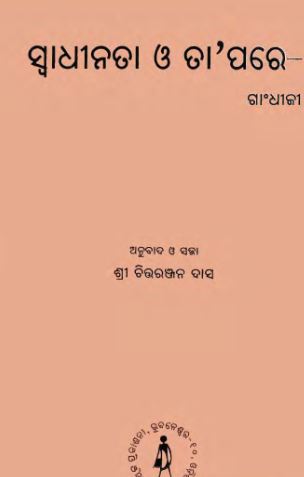In the pantheon of Indian literature, ‘Swadhinata O Ta’pare’ (Independence and After) stands as a seminal work, chronicling the timeless values of freedom and non-violence. Authored by Mohandas Karamchand Gandhi, the book was originally published in 1949 and later saw its second edition in 2003, featuring a masterful translation by Chittaranjan Das into Odia.
Mohandas Karamchand Gandhi, often revered as the ‘Father of the Nation,’ invoked the spirit of ‘Ahimsa’ or non-violence as a cardinal principle in the ardent struggle for India’s independence from colonial rule. Gandhi’s writings have consistently reflected his unwavering commitment to moral values, satyagraha (truth force), and civil disobedience as righteous pathways to achieving freedom.
‘Swadhinata O Ta’pare’ is not merely an essay; it is Gandhi’s philosophical treatise that encapsulates the essence of India’s freedom movement and the monumental responsibilities that followed. It transcends the temporal constraints of its era, offering enduring insights into the principles of governance, societal reforms, and ethical living, applicable to any liberated nation and its citizens.
The first half of ‘Swadhinata O Ta’pare’ meticulously chronicles the arduous journey towards independence. Gandhi’s reflections delve into the heart of colonial repression, the significance of unity amidst diversity, and the power of non-violence. He speaks to the sacrifices made by countless individuals, the resilience of the people, and the strategic orchestration of civil disobedience movements that collectively culminated in India’s liberation.
Gandhi articulately addresses the spirit of swadhinata (independence), emphasizing that it is not merely the political freedom from colonial rule but also an emancipation from social evils, economic exploitation, and mental subjugation. His focus on self-reliance, sustainable village industries, and the rejuvenation of indigenous crafts underscores a holistic approach to independence.
The subtitle, ‘Ta’pare’ (and After), initiates a profound discourse on the duties that accompany freedom. Gandhi’s writing postulates that true independence entails a continuous commitment to justice, equality, and the moral elevation of the populace. He underscores the importance of building a cohesive society grounded in ethical values and collective well-being.
The book further navigates through the challenges of post-independence India—addressing the plagues of poverty, illiteracy, and communal strife. Gandhi’s vision of ‘Ram Rajya’ (the kingdom of God) is elucidated as an aspirational ideal where governance is synonymous with righteousness, fairness, and holistic development.
Chittaranjan Das’s translation not only brings Gandhi’s profound philosophy to the Odia-speaking populace but also enriches it with cultural nuances that resonate deeply with regional sensibilities. His linguistic fidelity and interpretative acumen ensure that the essence of Gandhi’s teachings is pristinely preserved and accesible.
Published in an India that was still finding its feet post-independence, ‘Swadhinata O Ta’pare’ continues to be a guiding light. The second edition released in 2003, reaffirms its enduring relevance. It is a book that provokes introspection, urging contemporary readers to evaluate the progress made and the path ahead.
In conclusion, ‘Swadhinata O Ta’pare’ is not just a retrospection of India’s past but an enduring call-to-action for future generations. It reminds us that while independence is a monumental achievement, the real challenge lies in upholding the values of non-violence, justice, and universal brotherhood that Gandhi so dearly cherished. As we turn its pages, we are called to be vigilant torchbearers of the freedoms we inherit and the principles we must uphold.
Books Info
| Books name | Swadhinata O Ta’pare/ସ୍ବାଧିନତା ଓ ତା’ପରେ |
| Author | Mohandas Karamchand Gandhi; Chittaranjan Das, Tr. |
| No Of pages | 66 |
| Publisher | Pathika Prakahsani |
| Publication | 1949, 2003 2e. |
| Printed At | Shoibhan Press |
| Distributor | NA |

